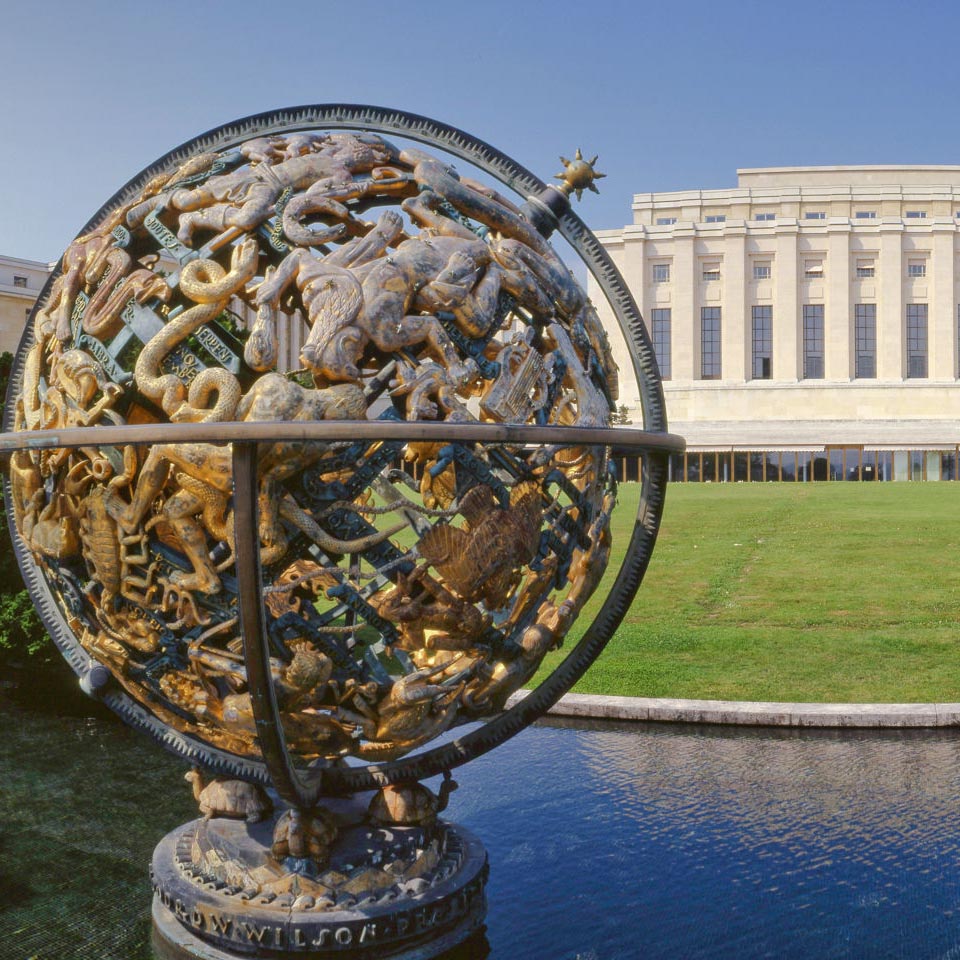DefendDefenders hit the ground running at the first session of the Human Rights Council in 2016, with human rights defenders (HRDs) across the entire East and Horn of Africa facing increasing restrictions on their rights and their ability to work. As the threat of terrorism and the European refugee crisis rise on the international policy agenda, governments across the board are looking for new measures to tackle these unprecedented challenges, sometimes at the expense of fundamental human rights. Civil society space around the world in under attack, and my delegation spent two weeks in Geneva looking to advocate against the extremely worrying trends we have witnessed in Burundi, South Sudan, Uganda, Djibouti, Rwanda, and Ethiopia.
- Go straight to our advocacy on Burundi, elections in the East and Horn of Africa, Ethiopia,
and South Sudan or a full overview of all our publications during this session.
On 1 March, civil society leaders from across the globe, including DefendDefenders, met with UN Secretary-General Ban Ki-moon on the side-lines of the High Level Segment of the 31st Session, to discuss pressing issues affecting human rights defenders worldwide. Civil society members were able to raise crosscutting human rights challenges, including shrinking civic space, increased repression during elections, reprisals, drug policies, and human rights, as well as countries of concern such as Burundi, Egypt, Burma, Sri Lanka and South Sudan.
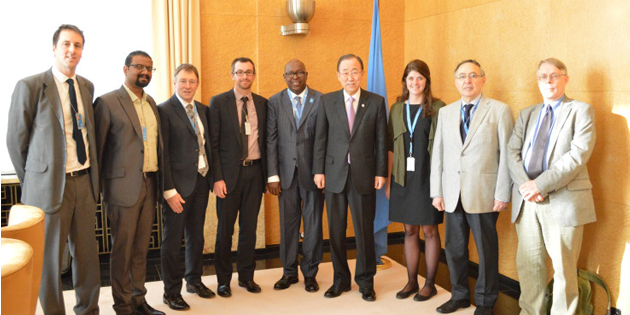
On 4 March, together with leading Burundian activist Pierre Claver Mbonimpa, and partners from CIVICUS: World Alliance for Citizen Participation, Protection International and Lifeline Embattled CSO Assistance Fund, our delegation met with the High Commissioner for Human Rights Zeid Ra’ad Al Hussein and his senior Africa staff to discuss the on-going crisis in Burundi. The High Commissioner and his team’s dedication to the Burundian people, and their sincere concerns for the situation were highly appreciated. We were pleased to be able to share perspective on the worsening crisis and our recommendations on how the international community can take action to address the grave human rights abuses taking place in Burundi today.
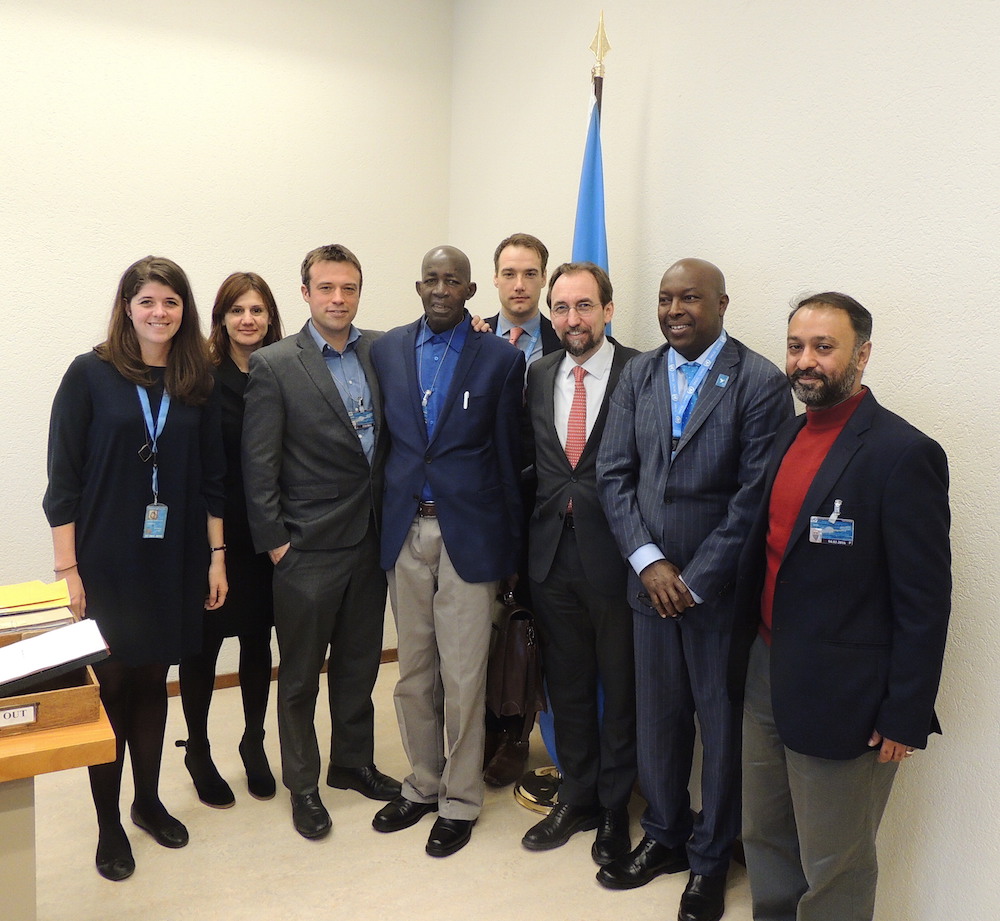
Back to top
Continued engagement on Burundi
Over the course of these two weeks, our delegation, which included human rights activist Pierre Claver Mbonimpa, continued to raise the worsening crisis in Burundi. On 3 March, Pierre Claver Mbonimpa delivered a statement on behalf of DefendDefenders, CIVICUS and Protection International during the Interactive Dialogue with the Secretary General’s Special Advisor on the prevention of genocide and the Special Rapporteur on human rights defenders. In his statement, he highlighted the untenable conditions for civil society actors inside Burundi and warned the Council of the possibility of reprisals against those who collaborate with independent expert missions.
buy desyrel online blackmenheal.org/wp-content/languages/new/noprescription/desyrel-no-prescription.html no prescription
“During the Special Session in December 2015, I spoke of the Burundian Government’s brutal campaign to suppress dissenting voices. Since then, reports of enforced disappearances, arbitrary arrests, brutal torture, sexual violence and extrajudicial executions have only increased. Since then, the Government of Burundi has assumed a seat in this very room, despite the worsening crisis and its flagrant refusal to abide by its obligations as a member of the Council.”
– Statement by Pierre Claver Mbonimpa during the Interactive Dialogue with the Special Rapporteur on human rights defenders and the Special Advisor on the prevention of genocide.
Side-event on Burundi
On 4 March, I had the honour of moderating a high-level panel during our side-event on Burundi. Pierre Claver Mbonimpa shared the floor with Michel Forst, the Special Rapporteur on human rights defenders, Tom Gibson from Protection International and Cléa Kahn-Sriber from Reporters without Borders to discuss the worsening human rights situation and the way forward for the Council. The panellists were able to provide valuable insight into the situation on the ground, and what support is needed from the international community to resolve the Burundian crisis as well as prevent future election-triggered crises.
Michel Forst provided insight into his first official visit to Burundi, and highlighted the importance of de-escalation of the situation. Mr Forst strongly recommended that re-establishing free space for civil society be a central goal to the resolution of the crisis, and expressed his concern that similar warning signs to the ones he noted during his visit were being missed in several other countries.
Pierre Claver Mbonimpa highlighted the grave challenges faced by civil society working in Burundi today, as well as international organisations. A country without a civil society means that the population is voiceless. Victims today cannot share testimonies due to the very real threats to their lives and to the lives of their families. According to Tom Gibson of Protection International, the cancellation of the suspension of CSOs is critical if the government is to ensure that HRDs are able to return to work safely. The situation is reaching a boiling point, and we are facing the possibility losing the progress made over the past 30 years.
Cléa Kahn-Sriber of Reporters Without Borders highlighted the unique media landscape Burundi had before the crisis, operating relatively freely and actively taking part in democratic processes. According to Ms Kahn-Sriber, the media have become the first target of the government and face considerable pressure and threats from security forces and armed militia.
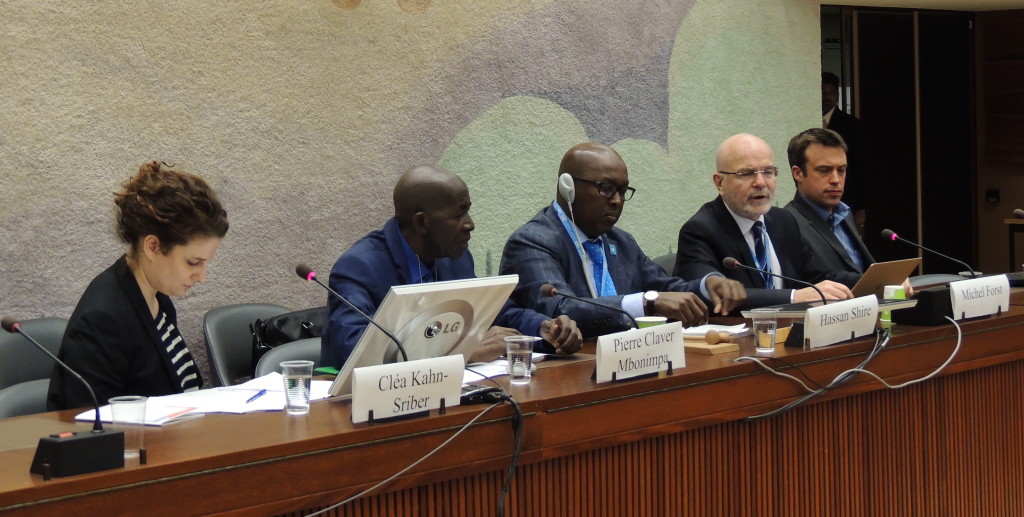
Back to top
Human rights defenders and elections: a rising challenge
My organisation has extensively documented the strategies of harassment, intimidation and attacks used to target human rights defenders in the context of elections in the East and Horn of Africa. Building on the side-event organised at the 30th Session of the Human Rights Council, DefendDefenders, together with our partners, organised a side-event looking into election-related restrictions on civic space and the challenges faced by human rights defenders engaging with electoral processes in Burundi, Uganda, Rwanda and Djibouti.
All panellists were able to share their testimonies on the different stages of elections their countries are in and highlighted several cross-cutting issues such as the independence of electoral commissions, the amendment of constitutions, and the misuse of legislation to restrict fundamental rights ahead of elections. They also recommended that the Human Rights Council and the international community more broadly take note of these warning signs and attempts by local civil society actors to sound the alarm ahead of electoral crises.
The panellists, Pierre Claver Mbonimpa (Burundi), Sheila Nabachwa (Uganda), Zakaria Abdillahi Ali (Djibouti), and Laurent Munyandilikirwa (Rwanda) were also able to provide insight into the extent to which the opposition and civil society in their countries are allowed space to express themselves. As Djibouti gears up to its presidential elections, which will take place in on 8 April, the government has quelled all attempts of critical voices to engage with the electoral process.
buy effexor online blackmenheal.org/wp-content/languages/new/effexor.html no prescription
In Rwanda, a country Mr Munyandilikirwa had to flee due to his human rights work, the independent human rights activists and journalists continue to face the difficult choice between silence and exile.
In all of these countries, journalists and human rights defenders attempt to shed light on the human rights abuses taking place in relation to elections; however, in many cases the international community has repeatedly failed to take adequate preventative action to increase scrutiny of countries entering electoral periods.
Back to top
Ethiopia and the Oromo protests
The joint compilation report of the Special Rapporteur on the Rights to Freedom of Peaceful Assembly and of Association, Maina Kiai, and the Special Rapporteur on Extrajudicial, Summary or Arbitrary Executions, Christof Heyns, was presented to the Council. The report provides a detailed analysis of the conditions and requirements for the right to freedom of peaceful assembly to be respected and protected, as well as practical recommendations to states.
During their interactive dialogue, our Advocacy Officer Estella Kabachwezi delivered a statement on the recent Oromo protests in Ethiopia, during which over 150 protestors have reportedly been killed and over 1,000 arrested. DefendDefenders called upon the Council to raise the grave violations of the right to freedom of peaceful assembly in Ethiopia. Additionally, we demanded that the government of Ethiopia release those arbitrarily detained during the protests and establish an independent, impartial, and transparent investigation into the deaths resulting from excessive use of force and other violations of human rights in the context of the protests.
I reiterate our call to all states to immediately seek to implement the recommendations in the Special Rapporteurs’ report, and respect the vital role peaceful assemblies play in the fulfilment of human rights.
My delegation also raised the worrying developments in Ethiopia during a side-event on the recent Oromo protests, organised jointly with our partners at CIVICUS, during which Awol Allo, of the Center for the Study of Human Rights – London School of Economics, and Yared Hailemariam of the Association for Human Rights in Ethiopia, discussed the roots of the current crisis in Oromia reason and shared findings of investigations that have been conducted locally. Our own Advocacy and Research Officer Clementine de Montjoye was also a panellist and spoke of the use of restrictive legislation to curtail the operating environments of HRDs, and the impact that these laws have had across the sub-region. Human rights defenders in Ethiopia are continuously faced with threats, intimidation and arbitrary arrests for working on sensitive human rights issues, such as the Oromo protests. This side-event was an important opportunity to analyse the current trends, and to shed light on on-going violations that have been so critically under-reported.
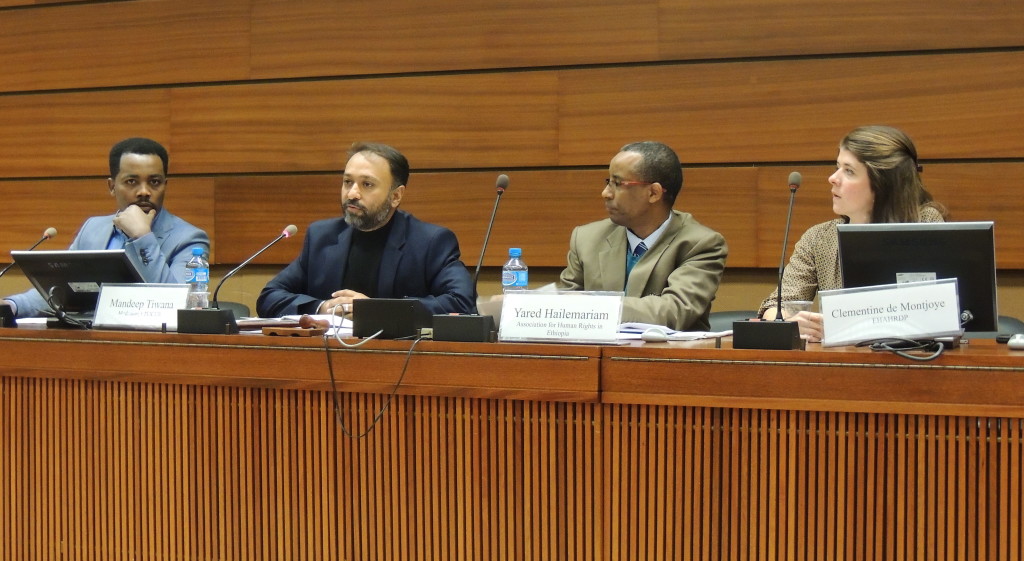
Back to top
South Sudan: one step closer to accountability
Building upon our intensive efforts to see the Council react substantively to the devastating war in South Sudan, we continued our advocacy at this Session, asking that a Special Mechanism to be established to work with regional efforts towards justice and accountability. I am extremely concerned about the recent surge in detention and torture of journalists and human rights defenders since January, particularly when these attacks are related to their reporting on the conflict and human rights violations committed by government actors. There is an urgent need for heightened international scrutiny of the peace agreement implementation during this sensitive transitional period.
On 23 March, DefendDefenders and CIVICUS read a joint statement during the Individual Interactive Dialogue on the High Commissioner’s report on South Sudan, calling for the establishment of a Special Mechanism and highlighting the critical role the Human Rights Council should be playing in bringing justice to the victims of the devastating civil war. On 23 March, a resolution was adopted without a vote establishing a Commission on the situation of human rights in South Sudan, which is an overdue but vital step towards greater justice and accountability in Africa’s youngest nation.
“Mr President, the people of South Sudan need the support of a Special Rapporteur to ensure constant scrutiny of the human rights situation in South Sudan during what will be a long and difficult transitional phase.
There cannot be sustainable peace and stability in South Sudan without accountability for the atrocities committed over the past 16 months, and our organisations believe that the Council has a crucial role to play in bringing justice to the victims of this devastating civil war.”
– Joint DefendDefenders and CIVICUS Statement during the ID on the High Commissioner’s Oral Update on South Sudan
To conclude, the first Human Rights Council session of 2016 was incredibly fruitful with many positive interactions with State delegations, high-level representatives, and fellow civil society activists. On top of our focus on South Sudan, Burundi and Ethiopia, our delegation delivered statements during the Oral Update of the Special Rapporteur on Eritrea, and the adoption of the UPR outcome on Rwanda. Though the 31st Session ended on 24 March, we will continue to work with the Council and UN mechanisms to promote the voices of human rights defenders in the East and Horn of Africa and highlight the rising challenges they are facing.
Hassan Shire
Executive Director of DefendDefenders
Chairman of the Pan-African Human Rights Defenders Network
Back to top
All articles and statements published by DefendDefenders during the 31st session of the Human Rights Council
- 23 March – Joint statement during the Individual interactive dialogue on the High Commissioner’s report on South Sudan.
- 23 March – Defenders speaking out: “Who will save the citizens of South Sudan if I stop my work?”
- 22 March – Joint letter to the Member States of the Council on the protection of HRDs working on economic, social and cultural rights
- 22 March – Joint statement calling for protection of HRDs in Egypt
- 18 March – Joint statement on the Adoption of the Universal Periodic Review Report on Rwanda
- 15 March – Joint statement during the Individual interactive dialogue with the Special Rapporteur on Eritrea
- 11 March – Oral statement on the joint report by Special Rapporteurs Maina Kiai and Christof Heyns.
- 9 March – Side-event on elections in the East and Horn of Africa
- 4 March – Oral Statement on Burundi read by Pierre Claver Mbonimpa
- 2 March – Side-event on Burundi
- 1 March – Global civil society meets with United Nations Secretary-General Ban Ki-moon
- 26 February – South Sudan: Call for accountability for past atrocities and on-going violations.
- 24 February – Ethiopia: Civil society calls upon Human Rights Council to investigate government crackdown on Oromo protest.

